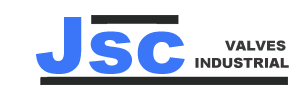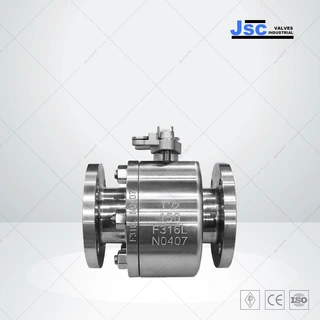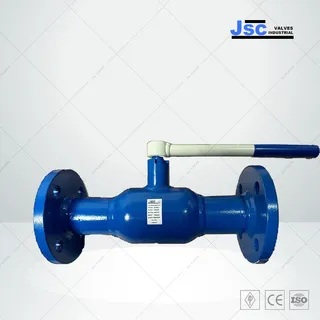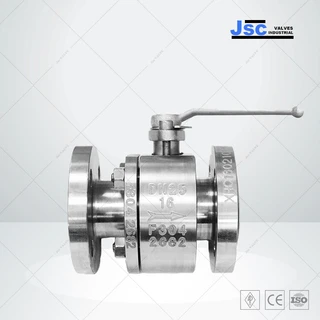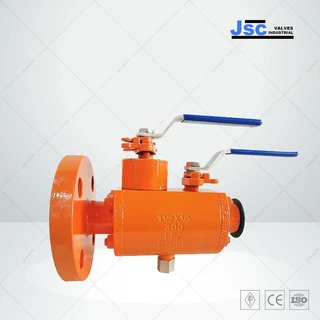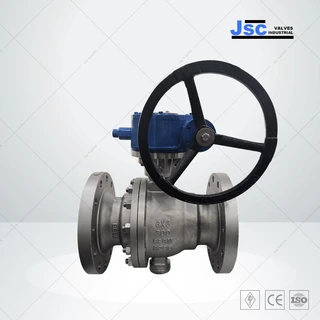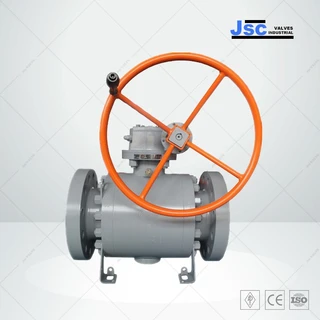ASTM A182 F316L Floating Ball Valve, API 6D, 3/4 Inch, 300 LB
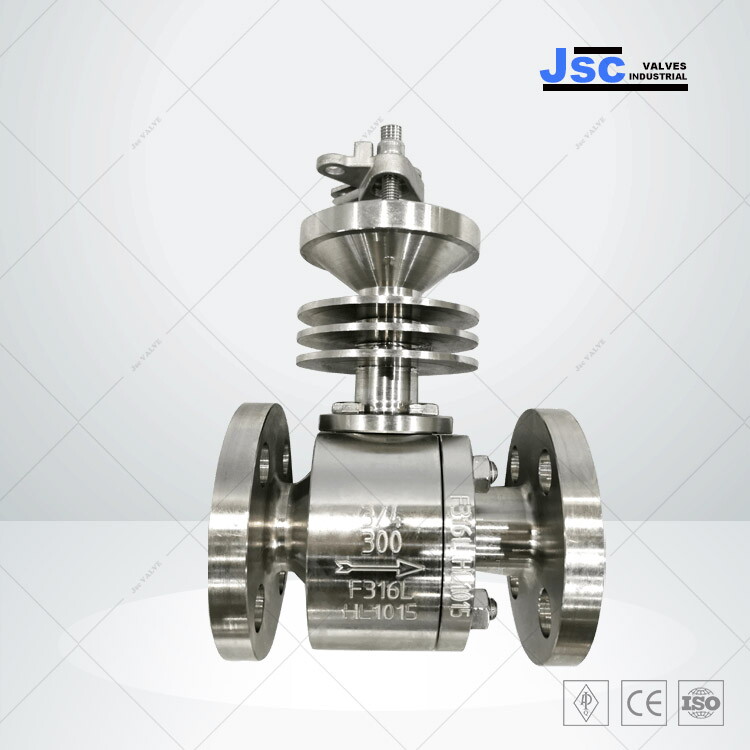
Key Specifications / Features
Model No.: JSC-240306-MSBV-01
Hits: 83
Discover our range of metal-seated floating ball valves designed for high-performance applications. Crafted from ASTM A182 F316L stainless steel and compliant with API 6D standards, these valves ensure reliable operation. With a size of 3/4 inch (DN20) and a pressure rating of Class 300 LB (PN50), they are suitable for demanding environments. Featuring a 2-piece forged body, extended bonnet, and RF ends, these valves offer durability and precision in fluid control systems.
Request a quote
Tags
Detail Information
Metal Seated Floating Ball Valve
Valve description: Ball valve, floating type, metal seat, forged body, 2 Piece, extended bonnet, high temperature
Body material: ASTM A182 F316L
Nominal diameter: 3/4 Inch (DN20)
Nominal class: Class 300 LB (PN50)
End connection: RF
Metal seat: F316L+WC
Face to face: ASME B16.10
Test and inspection: API 598
Design / Manufacture: API 6D
Mode of operation: Lever
Metal Seated Ball Valve is manufactured for high temperature up to 540℃ (may be higher based on the material of body and trim) or abrasion resistance. Our Metal Seated Ball Valves are Zero leakage (bubble tight seal). Metal Seated Ball Valve is also called metal to metal ball valve, as the seat and ball are made from metal.
For metal seated ball valve, the seat ring and ball are precisely machined, coated by high velocity oxygen fuel (HVOF) coating process and lapped to match ball, creating a positive seal for bubble-tight performance. Our Metal seated ball valves have many advantages such as excellent corrosion & wear resistance, tight shut-off, smooth control, low torque, wide temperature & pressure range, as well as stability under pressure. Metal seated ball valve provide long service life with outstanding fugitive emissions performance and low operating torques in even the toughest applications.
SIZE RANGE AND PRESSURE CLASS
Size Range: 1/2 Inch to 10 Inch (DN15-DN250)
Pressure Range: Class 150 LB to 2500 LB (PN16-PN420)
Features & Benefits
a) Unique, the metal seated ball valve with patented single-seat ball valve design. It has a flat spring set acting through a hard-faced bearing against the bottom ball shaft which provides sufficient initial ball-seat load for valve tightness, even at low delta P.
b) Metal seated ball valve proven in qualification tests and field operation to be solids–proof, even for the toughest applications on slurry service with solids particles.
c) Tightness rates: Allowable leakage rate at full Delta P: ASME/ FCI 70-2 Class VI/V. Tighter shutoff available upon request.
The leakage rate also can be customization from end-user request.
d) The metal seated ball valve with standard extension bonnet/stem, whose design base on the different temperature range.
e) Uni-directional or bi-directional sealing.
DESIGN STANDARDS
Design / Manufacture: API 6D, API 608, ASME B16.34, DIN 3357, EN 13709, GB/T 12237, BS 5351
Face to Face Length (Dimension): MFG, API 6D, ASME B16.10, EN 558-1, DIN 3202, JIS B 2002
Flanged Dimension: ASME B16.5, EN 1092-1, BS 4504, DIN 2501
Threaded Ends:
BSP Parallel: BS21Rp-ISO 228/1-ISO 7/1Rp
BSP Taper: BS21Rc-ISO 7/1Rc-DIN 2999/1
NPT: ANSI B1.20.1
B.W.-P.E.:ANSI B16.25 Sch.40-XS-80-160
S.W.: ANSI B16.11
Testing: API 598, API 6D, EN 12266-1, EN 1074-1, ISO 5208
Surface Coatings for Metal Seated Ball Valve
Unlike surface treatment methods whereby the existing surface is changed by diffusion, in surface coating an outer layer of new material is generated on the surface. The following types of surface coating methods are available in the JSC metal seated range; chromium carbide with nickel chrome binder (Cr3C2), tungsten carbide with cobalt binder (WC-Co), and stellite welding.

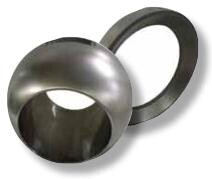
Valve Ball Hard Coating done by HVOF Valve Ball Hardness is Over 600 HRC
Stellite
Applications:
- Liquid + Gaseous media with partially entrained particles / solids (moderate operating cycle)
- Excellent wear resistance / good corrosion resistance
- Wide temperature range
A cobalt-based stellite coating on valve ball and seat provides excellent mechanical wear resistance, with good corrosion resistance at temperatures up to 538˚C (1000˚F). The Stellite is applied by a Plasma Thermal Arc (PTA) method. Most stellite alloys are cobalt based with elements of Chromium (Cr), Carbon(C), Tungsten (W) and Nickel (Ni). Stellite is broadly used in the pulp and paper industry, as well as in refining applications, such as catalyst handling and hydrocracker processes.
WC-Co (Tungsten Carbide)
Applications:
- Liquid + Gaseous media with partially entrained particles / solids (high operating cycles)
- Excellent abrasion resistance / good corrosion resistance
Tungsten Carbide with a cobalt binder coating applied by HVOF techniques similar to Cr3C2.WC-Co coating applied mainly to 400 series martensitic stainless steel results with micro-hardness as high as 72HRC. This coating resists cryogenic temperature down to -196˚C (-320˚F) and high temperatures up to 538˚C (1000˚F). WC-Co is a wear resistance and dense coating with chemical resistance to sulphur environment on Nickel based alloy.
Cr3C2 (Chromium Carbide)
Chromium Carbide with nickel chrome binder applied by a High Velocity Oxygen Fuel (HVOF) gun creates a 0.3mm hard outer layer. Cr3C2 coating applied to high strength steels, results in a micro-hardness of up to 68HRC. This coating resists cryogenic temperatures down to -196˚C (-320˚F) and high temperatures up to 815˚C. The valve maximum temperature is 650°C. All the temperatures above 650°C refer to the coating or bolts performance only (1500˚F). This multipurpose wear resistance coating is used extensively in the power generation, refining and hot catalyst handling services. Its limitations are in wet sulphur or chloride environments where sulphuric acid can form and attack the coating.
Coating Testing
Bond Strength Tensile Test
Shear Strength Tensile Test
Macro Hardness Rockwell Test
Porosity Determination
Bond Line Contamination
Abrasion Wear Testing
Valve description: Ball valve, floating type, metal seat, forged body, 2 Piece, extended bonnet, high temperature
Body material: ASTM A182 F316L
Nominal diameter: 3/4 Inch (DN20)
Nominal class: Class 300 LB (PN50)
End connection: RF
Metal seat: F316L+WC
Face to face: ASME B16.10
Test and inspection: API 598
Design / Manufacture: API 6D
Mode of operation: Lever
Metal Seated Ball Valve is manufactured for high temperature up to 540℃ (may be higher based on the material of body and trim) or abrasion resistance. Our Metal Seated Ball Valves are Zero leakage (bubble tight seal). Metal Seated Ball Valve is also called metal to metal ball valve, as the seat and ball are made from metal.
For metal seated ball valve, the seat ring and ball are precisely machined, coated by high velocity oxygen fuel (HVOF) coating process and lapped to match ball, creating a positive seal for bubble-tight performance. Our Metal seated ball valves have many advantages such as excellent corrosion & wear resistance, tight shut-off, smooth control, low torque, wide temperature & pressure range, as well as stability under pressure. Metal seated ball valve provide long service life with outstanding fugitive emissions performance and low operating torques in even the toughest applications.
SIZE RANGE AND PRESSURE CLASS
Size Range: 1/2 Inch to 10 Inch (DN15-DN250)
Pressure Range: Class 150 LB to 2500 LB (PN16-PN420)
Features & Benefits
a) Unique, the metal seated ball valve with patented single-seat ball valve design. It has a flat spring set acting through a hard-faced bearing against the bottom ball shaft which provides sufficient initial ball-seat load for valve tightness, even at low delta P.
b) Metal seated ball valve proven in qualification tests and field operation to be solids–proof, even for the toughest applications on slurry service with solids particles.
c) Tightness rates: Allowable leakage rate at full Delta P: ASME/ FCI 70-2 Class VI/V. Tighter shutoff available upon request.
The leakage rate also can be customization from end-user request.
d) The metal seated ball valve with standard extension bonnet/stem, whose design base on the different temperature range.
e) Uni-directional or bi-directional sealing.
DESIGN STANDARDS
Design / Manufacture: API 6D, API 608, ASME B16.34, DIN 3357, EN 13709, GB/T 12237, BS 5351
Face to Face Length (Dimension): MFG, API 6D, ASME B16.10, EN 558-1, DIN 3202, JIS B 2002
Flanged Dimension: ASME B16.5, EN 1092-1, BS 4504, DIN 2501
Threaded Ends:
BSP Parallel: BS21Rp-ISO 228/1-ISO 7/1Rp
BSP Taper: BS21Rc-ISO 7/1Rc-DIN 2999/1
NPT: ANSI B1.20.1
B.W.-P.E.:ANSI B16.25 Sch.40-XS-80-160
S.W.: ANSI B16.11
Testing: API 598, API 6D, EN 12266-1, EN 1074-1, ISO 5208
Surface Coatings for Metal Seated Ball Valve
Unlike surface treatment methods whereby the existing surface is changed by diffusion, in surface coating an outer layer of new material is generated on the surface. The following types of surface coating methods are available in the JSC metal seated range; chromium carbide with nickel chrome binder (Cr3C2), tungsten carbide with cobalt binder (WC-Co), and stellite welding.


Valve Ball Hard Coating done by HVOF Valve Ball Hardness is Over 600 HRC
Stellite
Applications:
- Liquid + Gaseous media with partially entrained particles / solids (moderate operating cycle)
- Excellent wear resistance / good corrosion resistance
- Wide temperature range
A cobalt-based stellite coating on valve ball and seat provides excellent mechanical wear resistance, with good corrosion resistance at temperatures up to 538˚C (1000˚F). The Stellite is applied by a Plasma Thermal Arc (PTA) method. Most stellite alloys are cobalt based with elements of Chromium (Cr), Carbon(C), Tungsten (W) and Nickel (Ni). Stellite is broadly used in the pulp and paper industry, as well as in refining applications, such as catalyst handling and hydrocracker processes.
WC-Co (Tungsten Carbide)
Applications:
- Liquid + Gaseous media with partially entrained particles / solids (high operating cycles)
- Excellent abrasion resistance / good corrosion resistance
Tungsten Carbide with a cobalt binder coating applied by HVOF techniques similar to Cr3C2.WC-Co coating applied mainly to 400 series martensitic stainless steel results with micro-hardness as high as 72HRC. This coating resists cryogenic temperature down to -196˚C (-320˚F) and high temperatures up to 538˚C (1000˚F). WC-Co is a wear resistance and dense coating with chemical resistance to sulphur environment on Nickel based alloy.
Cr3C2 (Chromium Carbide)
Chromium Carbide with nickel chrome binder applied by a High Velocity Oxygen Fuel (HVOF) gun creates a 0.3mm hard outer layer. Cr3C2 coating applied to high strength steels, results in a micro-hardness of up to 68HRC. This coating resists cryogenic temperatures down to -196˚C (-320˚F) and high temperatures up to 815˚C. The valve maximum temperature is 650°C. All the temperatures above 650°C refer to the coating or bolts performance only (1500˚F). This multipurpose wear resistance coating is used extensively in the power generation, refining and hot catalyst handling services. Its limitations are in wet sulphur or chloride environments where sulphuric acid can form and attack the coating.
Coating Testing
Bond Strength Tensile Test
Shear Strength Tensile Test
Macro Hardness Rockwell Test
Porosity Determination
Bond Line Contamination
Abrasion Wear Testing
Comment Form
